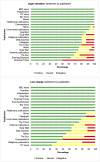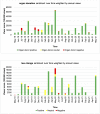Analysis of content and online public responses to media articles that raise awareness of the opt-out system of consent to organ donation in England
- PMID: 36530724
- PMCID: PMC9751921
- DOI: 10.3389/fpubh.2022.1067635
Analysis of content and online public responses to media articles that raise awareness of the opt-out system of consent to organ donation in England
Abstract
Background: Preceded by a national media campaign, in May 2020, England switched to a soft opt-out system of organ donation which rests on the assumption that individuals meeting specific criteria have consented to organ donation unless they have expressed otherwise. We aimed to learn more about how the changes were communicated, how people responded and any discrepancies between key messages and how they were interpreted by the public.
Methods: Summative content analysis of 286 stories and related reader-generated comments in leading UK online news sources (April 2019 to May 2021). Further detailed thematic analysis of 21 articles with reader-generated content, complemented by thematic content analysis coding of all 286 stories.
Results: Most media coverage on both organ donation and the law change was positive, with little variation over time or between publications. The importance of organ donation, benefits of the law change, and emotive stories (often involving children) of those who had donated an organ described as "superheroes" or those who had received organs as benefiting from a "miracle" were frequently cited. In contrast, reader-generated comments were markedly more negative, for example, focusing on loss of individual freedom and lack of trust in the organ donation system. Commentators wished to be able to choose who their organs were donated to, were dismissive and blaming towards minority ethnic groups, including undermining legitimate worries about the compatibility of organ donation with religious beliefs and end of life cultural norms, understanding and acceptance of brain-stem death and systemic racism. Misinformation including use of inflammatory language was common.
Conclusion: The portrayal of donors and recipients as extraordinary is unlikely to help to normalise organ donation. Undermining legitimate concerns, in particular those from ethnic minorities, can alienate and encourage harmful misinformation in underrepresented groups. The discrepancies between the tone of the articles and the readers comments suggests a lack of trust across the public, health, policy and media outlets. Easily accessible, ongoing and tailored sources are needed to mitigate misinformation and disinformation and ensure key messages are better understood and accepted in order to realise the ambitions of soft opt-out organ donation policies.
Keywords: consent; media campaigns; media content analysis; organ donation; public opinion; soft opt-out.
Copyright © 2022 Faherty, Williams, Noyes, Mc Laughlin, Bostock and Mays.
Conflict of interest statement
The authors declare that the research was conducted in the absence of any commercial or financial relationships that could be construed as a potential conflict of interest.
Figures
Similar articles
-
Subgroup differences in public attitudes, preferences and self-reported behaviour related to deceased organ donation before and after the introduction of the 'soft' opt-out consent system in England: mixed-methods study.BMC Health Serv Res. 2024 Nov 21;24(1):1447. doi: 10.1186/s12913-024-11821-3. BMC Health Serv Res. 2024. PMID: 39574144 Free PMC article.
-
'If I donate my organs it's a gift, if you take them it's theft': a qualitative study of planned donor decisions under opt-out legislation.BMC Public Health. 2019 Nov 6;19(1):1463. doi: 10.1186/s12889-019-7774-1. BMC Public Health. 2019. PMID: 31694604 Free PMC article.
-
A Qualitative Content Analysis of Comments on Press Articles on Deemed Consent for Organ Donation in Canada.Clin J Am Soc Nephrol. 2022 Nov;17(11):1656-1664. doi: 10.2215/CJN.04340422. Epub 2022 Oct 26. Clin J Am Soc Nephrol. 2022. PMID: 36288931 Free PMC article.
-
Opt-out policy and the organ shortage problem: Critical insights and practical considerations.Transplant Rev (Orlando). 2021 Jan;35(1):100589. doi: 10.1016/j.trre.2020.100589. Epub 2020 Nov 22. Transplant Rev (Orlando). 2021. PMID: 33232867 Review.
-
A Systematic Review of Opt-out Versus Opt-in Consent on Deceased Organ Donation and Transplantation (2006-2016).World J Surg. 2019 Dec;43(12):3161-3171. doi: 10.1007/s00268-019-05118-4. World J Surg. 2019. PMID: 31428836
Cited by
-
"I am in favour of organ donation, but I feel you should opt-in"-qualitative analysis of the #options 2020 survey free-text responses from NHS staff toward opt-out organ donation legislation in England.BMC Med Ethics. 2024 Apr 20;25(1):47. doi: 10.1186/s12910-024-01048-6. BMC Med Ethics. 2024. PMID: 38643137 Free PMC article.
-
[The hospital coordinator for organ and tissue donation for transplantation in Mexico: lessons from the British model].Rev Med Inst Mex Seguro Soc. 2025 Mar 3;63(2):e6584. doi: 10.5281/zenodo.14616759. Rev Med Inst Mex Seguro Soc. 2025. PMID: 40273303 Free PMC article. Spanish.
References
-
- WHO . Donation and transplantation. WHO (2013). Available online at: https://www.who.int/health-topics/transplantation#tab=tab_1 (accessed February 11, 2020).
-
- Organ Donation and Transplantation 2030: Meeting the Need A ten-year vision for organ donation and transplantation in the United Kingdom & Social Care . Available online at: https://www.odt.nhs.uk/odt-structures-and-standards/key-strategies/meeti... (accessed November 19, 2022).
-
- Niven J, Chalmers N. Opt out organ donation: A rapid evidence review. Health and Social Care Social Research. (2018). Available online at: https://www.gov.scot/binaries/content/documents/govscot/publications/res... (accessed November 19, 2022).
Publication types
MeSH terms
LinkOut - more resources
Full Text Sources
Miscellaneous





